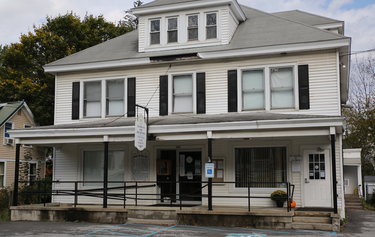Berne comp plan: Lack of implementation is multifaceted
BERNE —In November, Berne Planning Board member Lawrence Zimmerman resigned from his post over frustrations with the town board and what he sees as its failure to adhere to the guidance of the town’s comprehensive plan, specifically the creation of various committees that Zimmerman said would allow greater public input into planning decisions.
In his resignation letter, which he shared with The Enterprise, Zimmerman suggested incorrectly that the town’s failure to implement the features of the plan was unconstitutional, therefore creating legal vulnerability within all land-use regulations and decisions created since the plan’s adoption in 2017 — a point he made more explicitly in a follow-up interview.
He illustrated his argument to The Enterprise with a hypothetical case in which the town approves an industrial solar project “without the benefit of a comprehensive plan” and upset homeowners sue the town for that reason. “That [lawsuit] would be successful because the comprehensive plan is inactive,” he said, and went on to accuse the current Republican-dominated town board of not caring about the problems such a scenario would bring.
While it is not illegal for a municipality in New York to ignore its own comprehensive plan — comprehensive plans are not regulatory, which Berne’s own plan acknowledges — Zimmerman’s frustrations are nevertheless valid insofar as comprehensive plans are designed (with considerable effort) to be frequent points of reference for those with regulatory abilities, something that is enforced to some degree.
For example, Knox, in 2019, was unable to pass a major zoning change as an indirect result of the fact that the proposal failed to meet the county planning board’s standards for recommendation, in part because, in the eyes of the county planning board, the proposal went against the goals of the town’s comprehensive plan.
Like all four Hilltown plans, Knox’s prioritized rural character. Without the county planning board’s recommendation, the town board needed to obtain supermajority approval (four out of five votes in favor, instead of the usual three) to pass the law, which it was unable to do at the time.
So, it’s correct that, having not implemented these committees, the Berne Town Board might be getting in the way of its own goals since it’s distantly possible that the town could find itself in the same position Knox was in two years ago.
An important factor in Zimmerman’s resignation is that he, a Democrat, does not have faith in the Republican-backed board majority that now runs the town, and which has just secured every seat on the board in this year’s election, since he believes that the town board is unconcerned with the will of the people based on a number of scandalous decisions it has made since it came to power in 2019.
Neither Supervisor Sean Lyons nor Deputy Supervisor Dennis Palow, who was just elected to be the new supervisor beginning next year, responded to requests for comment.
Planning Board Chairman Joseph Martin, who was appointed the planning board as a replacement in 2020 and named chairman soon after, and who endorsed the Republican-backed candidates in a letter to the Enterprise editor this year, said that, as far as he’s concerned, the planning board does adhere to the broad guidance of the comprehensive plan.
“Mr. Zimmerman’s resignation is of course his choice and I respect that,” Martin wrote in an email. “We had a good working relationship in the Planning Board and everyone brings to the table different aspects that are important. What I’ve been a part of with regards to implementing the Comprehensive Plan is it has been the core of decision making. Does it need work? Maybe. Do we need more input from the community? Absolutely!!”
But the planning board’s relationship with the comprehensive plan is somewhat different from the town board’s relationship, particularly because the planning board by and large deals with specific projects, not regulation, and in the Hilltowns, projects that would have a major impact on the nature of whatever community are few and far between.
For perspective from the regulatory side, former town board member Dawn Jordan, a Democrat when she left office in 2019, told The Enterprise earlier this month that she doesn’t “think it was anyone’s reasonable expectation at the time that all of the committees and all of policies in the comprehensive plan would be implemented immediately upon adopting it, or even within the first five years.”
She recalled that her colleague, former town board member Joe Golden, had once told her, “Government moves slowly, and that’s a good thing,” which she described as “one of the most important lessons” she had learned from him.
“It was our hope, however, to move toward those goals in a steady manner,” Jordan went on. “Some of the major things we did accomplish, such as banning hydrofracking (I think we did that before the plan’s final adoption, actually) and adopting protective solar regulations. It is my belief that if the town board had remained made up of individuals whose goal was to work together cooperatively for the betterment of our town and residents, more of the comp plan goals and suggested committees would have come to fruition.”
With that in mind, Jordan also said of Lyons and Palow that she “had the distinct sense that Sean and Dennis had nothing but disdain for the comprehensive plan, and I wouldn’t imagine they hold any desire to see its goals put into practice.”
And, when Democrats were still a majority force on the board, Jordan said their time was “taken up with putting out fires caused by the remaining members of the board, the highway superintendent and some of the other staff. We also were put in the position of defending ourselves against legal investigations brought by these people. In order for a municipality to flourish and for things like the goals in the comprehensive plan to be accomplished, board members need the time to work on them.”
As for the committees, Jordan indicated, they rely on a volunteering public, which is often difficult to rouse for matters of municipal interest, and perhaps, Jordan said, all the more so when partisanship creates a hostile environment, as it had when Jordan was on the board, and which continues to this day.
“As it was, we were losing planning board and zoning board members, as well members of the Switzkill Farm board and conservation board,” Jordan said. “Those positions on already established boards had to take priority over any new committee we might have wanted to have set up, so even if we had had the time, I don’t think we would have considered it, as I don’t know where we would have found people willing to fill them. Very few people want to give of their time and effort when they see what they were seeing happen during those two years.”


